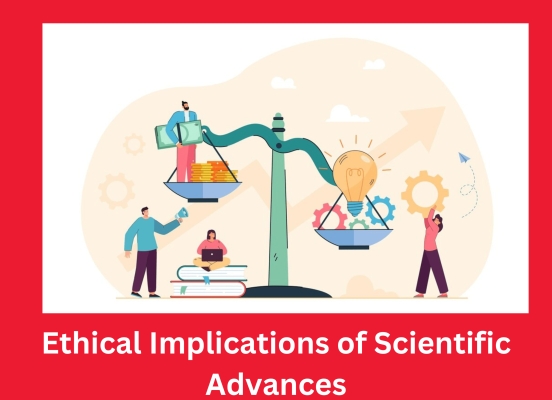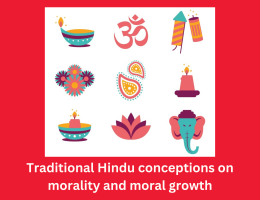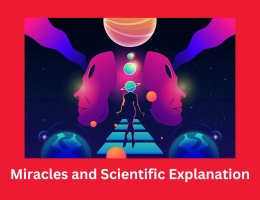
Ethical Implications of Scientific Advances: Integrating Religious Principles into Decision-Making
- By admin --
- Friday, 08 Mar, 2024
The ethical ramifications of modern-day technologies like genetic engineering, synthetic intelligence, and cloning have received prominence in an era characterised by using exceptional clinical development. Morality, accountability, and human dignity come to be greater urgent issues as humanity uses those innovations to influence the direction of our planet. In this talk, we look at how religious precepts would possibly offer useful course while negotiating the problematic ethical panorama of medical development.
Religious traditions have constantly been crucial in forming moral principles and directing conduct in people. Religions offer deep insights into the intrinsic really worth of existence, the sacredness of introduction, and the values of justice and compassion, whether or not via sacred texts, ethical precepts, or theological mirrored image.These non secular teachings assist humans and society navigate the moral quandaries added up through clinical discoveries by way of serving as an ethical compass within the face of fast technological innovation.
One of the most large moral issues associated with era breakthroughs is the alteration of genetic fabric through strategies which includes gene boosting and genetic change. These generation beautify tough moral dilemmas about the bounds of human involvement within the herbal world at the equal time as additionally supplying choice for making improvements to human fitness, curing hereditary illnesses, and increasing agricultural productivity. Religious perspectives allow for consideration of the moral consequences of genetics and emphasize the importance of humility, lifelong acceptance, and identity management
The idea of human dignity, which emphasizes the inherent and indeed virtuous rights of every body, is the foundation of religious traditions in moral philosophy. As such, concerns about consent, equity, and social justice are frequently primary to discussions about the moral use of genetic technologies. From a Christian angle, the search for genetic development wishes to be restrained via a dedication to preserving the well worth and welfare of each character inside the community, in particular the weakest and most marginalized.
Furthermore, Christian teaching forbids creating the author’s position and warns against the dangers of arrogance. Genetic engineering presents the opportunity for dramatic outcomes, contributing to increased socioeconomic inequality, decreased biodiversity, and loss of the cultural counterpart, with the fact that it is regardless of its ability to reduce suffering and enhance human well-being. Individuals and society can approach genetic generation with a enjoy of ethical obligation and ethical discernment via integrating spiritual ideas of humility and reverence for existence into ethical issues.
Parallel to this, the improvement of artificial intelligence (AI) prompts crucial ethical debates concerning the character of moral enterprise, autonomy, and attention. Concerns about the potential consequences of AI systems in human civilization, including privacy, productivity, and will formation, as they develop more complex and self-governing Religious focuses on the importance of watching emphasizes ethics, responsibility, and human development and provides meaningful analysis of AI for ethical issues.
From a theological angle, compassion, equity, and appreciate for human dignity ought to be the guiding ideas in the improvement and application of AI. Religious doctrine warns towards the technological dehumanization of people and using human beings as tools for egocentric functions. Instead, they support a holistic method that balances medical development with moral concerns, ensuring that AI systems are built and designed in a manner that prioritizes human nicely-being and promotes social concord.
In addition, religious tradition emphasizes the significance of ethical obligation and moral judgment in improving and using artificial intelligence. As AI systems turn out to be extra unbiased and able to making choices that affect human lives, there are questions of shared duty and ethical implications on the algorithmic choice and design ground. Religious views contribute to the effectiveness of moral rules that prioritize transparency, equity, and the protection of human rights in the improvement and implementation of AI structures.
Another medical development that brings good sized moral worries regarding the nature of identity, kinship, and the sanctity of existence is cloning. Cloning technologies boost ethical questions about the monetization of life and the manipulation of genetic material, at the same time as they have got the potential to strengthen medicinal drug and shop endangered species. Religious viewpoints emphasize the value of keeping the integrity of creation and spotting the distinction of all living things, which gives insightful records approximately the ethical implications of cloning.
From a theological perspective, values of appreciate for existence, kindness, and the advancement of human happiness must serve as the muse for the moral utility of cloning generation. Religious teachings recommend for a holistic method that takes into account the religious, emotional, and relational elements of human life and warn towards the instrumentalization of lifestyles for ideological or commercial ends. Cloning is a tough moral issue that may be wisely and discernmently navigated through people and society if ethical discussions are based on non secular values of appreciate for the sacredness of existence.
Religious viewpoints also emphasize the importance of moral duty and moral judgment inside the advancement and use of cloning technologies. Questions about the feasible results of cloning technology on human civilization, inclusive of the ones touching on identification, own family dynamics, and the definition of kinship, floor because the technology develops and becomes more normally to be had. Non-secular traditions on the merits of synthetic technologies contribute to an environment that has ethical imperatives that place primacy on the protection of human dignity, social justice a in developing it, and in preserving the integrity of tourism
Finally, people, societies and religious institutions face a wide range of challenges due to the ethical implications of technological advances such as genetic engineering, artificial intelligence and cloning. Through the incorporation of Christian values together with compassion, fairness, and respect for existence into ethical discussions, we are able to responsibly and wisely traverse the difficult panorama of technological development. By doing this, we admire the holiness of creation, defend the consideration of all residing matters, and work to create a global that is extra compassionate and only for coming generations.





